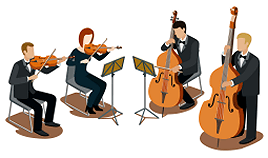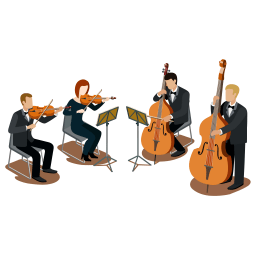
Divertimento originates from the Italian word for "diversion." It was a light versatile composition primary used for entertaining special guests or visiting dignitaries. The divertimento might be written in three, five, or up to nine movements, usually four or five, inviting certain parts such as keyboard, stringed, or wind instruments to take part.
The divertimento reigned tops in 18th century Vienna and became very popular in Bohemia, Italy, and Germany as well. Composers of the 18th century found favor in the divertimento including Leopold Mozart and his son Wolfgang along with others like Joseph Haydn and Austrian Carl Dittersdorf composing symphonies, chamber music, and opere buffe. Inspired by Haydn, Dittersdorf and Haydn met in 1764 and became good friends just prior to his writing '15 Divertimenti.'
The divertimento was eventually overshadowed by the string quartet in the early to mid 19th century. In the 20th century, the divertimento, the term, not the musical style, was revived as light pieces for strings or chamber music by Hungarian composer Béla Viktor János Bartók's 'Divertimento for String Orchestra' and a few other composers.
Classical Divertimento
'String Quartet Divertimento'
Composed by Joseph Haydn 1792
Modern Divertimento
'Divertimento on Sellinger's Round'
Composed by Sir Michael Kemp Tippett 1953
1693
1762
1765
1768
1787
1816
1892
1920
1939
1953
1964


